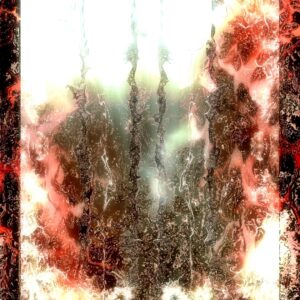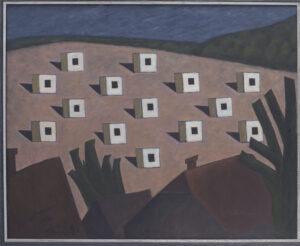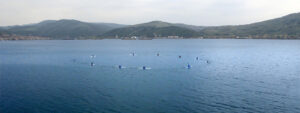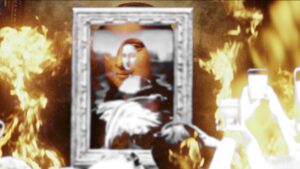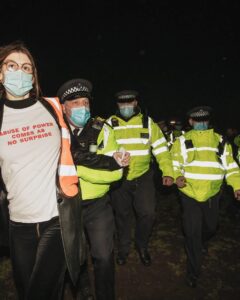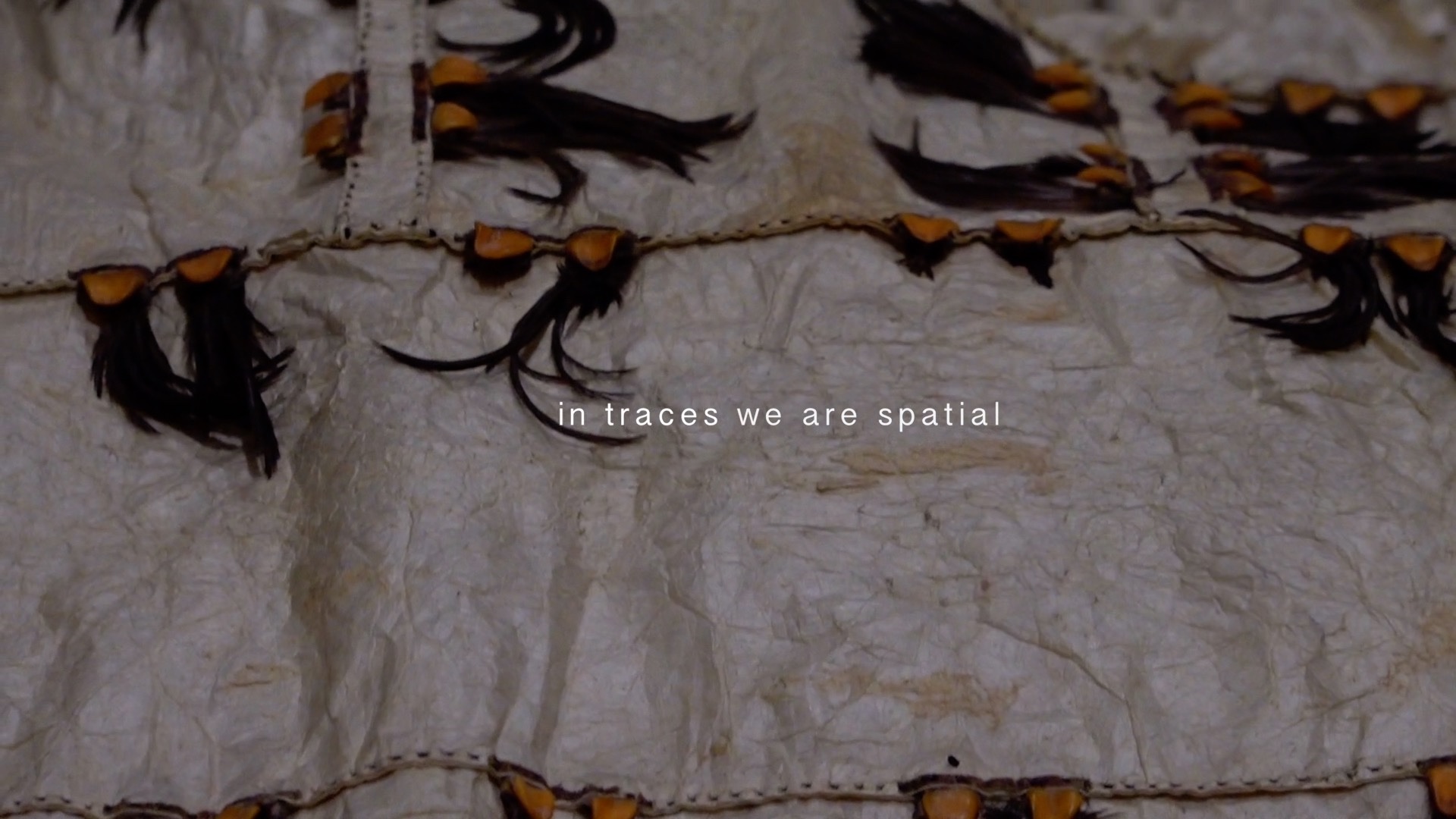Contents
The JVC Palestine Portfolio
Articles
Neta Alexander and Tali Keren Paper, glass, algorithm: teleprompters and the invisibility of screens
Julietta Singh and Chase Joynt On nesting
Georgina Kleege The art of touch: lending a hand to the sighted majority
Katerina Korola Blue like the Mediterranean: the work of the monochrome in The Atlas Group Archive
https://journals.sagepub.com/toc/vcua/20/2
The JVC Palestine Portfolio Introduction
Journal of Visual Culture’s Editorial Collective has a longstanding commitment to tracking and analyzing critically the continued unfolding of racialist, colonialist, and jingoistic discourses. The journal often provides a critical space wherein these discourses can be researched and debated so as to redress the social, political, and ethical injustices that continue to plague the world we share. Everything we do in this journal exists under the sign of Stuart Hall’s vital challenge: ‘We must mobilise everything [we] can find in terms of intellectual [and other] resources in order to understand what keeps making the lives we live and the societies we live in profoundly and deeply antihumane in their capacity to live with difference’. As a Collective, then, we stand in solidarity with Palestinians against Israeli settler colonialism and the Apartheid that results from it.
Compelled to respond to the urgency of the moment instigated by the Israeli regime’s actions in Gaza in May and June 2021, which we also acknowledge as a part of the ongoing Nakbah and an extension of official policies of displacement and erasure since 1948, we sent out an email with the subject line: ‘Journal of Visual Culture for Palestine: a call to [name of recipient]’, asking for a favour, for cooperation, for a contribution. The email in full is as follows:
Dear [name of recipient].
Standing in solidarity with Palestinians, as a Collective we know, provoked by the forced expulsions and dispossession in Jerusalem, the violence in al-Aqsa, and the attacks by the Israeli regime on Gaza earlier this month, that we need to act, and offer Journal of Visual Culture as an open and free platform for assembling, debating, and distributing. What can we do? In addition to making (and signing) statements, demonstrating, and raising funds, this is something we as an academic journal can do. So we ask you this favour: we would please like to enlist your cooperation, to make a modest contribution (a text of 1,000-1,500 words, a word/image contribution, an image or series of images) towards this section of the journal on the visual, material, and/or environmental cultures of Palestine 2021.
Contributions may be called forth from any of the following concerns (or anything else that’s concerning you about the occupation and its histories currently): settler colonialism; land, groundwork, dispossession, normalizing military occupation, and apartheid; homonationalism; protest and activism; asymmetric warfare; state-sanctioned violence/war crimes; Zionism and anti-Zionism; antisemitism and Islamophobia; resistance; conflict, fear and trauma; destruction and rebuilding; health, eco-social and education infrastructure; vaccine discrimination; technologies of memory; surveillance and cartography; flags and signs and posters; the call for Boycott, Divestment and Sanctions; the struggle for self-determination; the right of return; hope and speculative futures.
We will assemble a polyphony of thoughts and writings and images and provocations by scholars, artists, designers, architects, urban planners, visual activists, and culture workers that’ll come together to amplify internationally these serious, urgent matters by way of an academic journal. Serial periodicals are not exactly known for their speed. We do, though, have a small window that’ll enable us to organise this section in time for our forthcoming issue, which is due out in August. It’s an opportunity we feel we must seize. In making a contribution, we’d hope you can share it with us by the end of June/early July, which we realise is ridiculously soon, but this will give us enough time to design/format them, publish them in August, and get them circulating as quickly and as widely as possible. Our publisher Sage has confirmed that this section of the August issue will be free to access. We intend, then, to ‘push’ it via the Sage site, our satellite site, social media, and to the c 90,000 members of the journal’s networks/extended communities of interest; and we’d certainly encourage you to do likewise.
(Note, we have over the last few years found ways to extend the form and the function of the academic periodical, by, for instance, crafting free virtual issues of the journal; initiating Dispatches, our online open source initiative on ‘Ecologies’ and ‘Social Unrest’ (http://www.journalofvisualculture.org/), and instituting a recent collaboration with the Harun Farocki Institut on Covid-19 (https://www.harun-farockiinstitut.org/en/category/rosa-mercedes-en/02-en/).)
For your information, the names of those we’re reaching out to are as follows: [and here we included a list of 66 individuals, collectives, groups, and cultural institutions] Please do recommend to us friends or colleagues that you believe we should invite to contribute to this initiative, to also share their words and images, their words and images as actions.
Thank you.
With our best wishes, David Ayala-Alfonso, Manca Bajec, Jae Emerling, Irene Chien, Rahul Mukherjee, Marq Smith, and Øyvind Vågnes
As the journal’s Editorial Collective, we thus asked for voices to bear witness in some manner to the systemic racism, militarized destruction, and human rights abuses committed against the Palestinian people as it is occurring in the here-and-now. At stake here is nothing less than an attempt at solidarity, a global community insisting that to create and to share this world requires exposing the historical and contemporary discourses of colonialism, racialism – in fact any cultural, ethnic, or nationalistic claims of transcendence or superiority – and the neoliberal global capitalism that abets them.
It has long been the case that the discourse surrounding Palestine/Israel has wielded the illogic that any criticism of Israel is an antisemitic statement. Aside from the willful censorship implicit in this claim, we also know how and why it, in turn, renders us complicit with the Israeli regimes’ actual policies, behaviours, and actions in relation to the Palestinians. In the U.S. the media manages our ability to view and to comprehend the full effects of military strikes on housing complexes and the civilian deaths that result from them. In other countries, like Germany, there is total denial of such realities.
Hence the complexity and contradictions of the media discourse around these events. In response we insist on foregrounding how and why critical and ethical discourse takes place across and between the sayable and the visible; and in so doing we are attempting to voice our refusal to remain silent, invisible, antihumane. Our labor is to foreground and to reframe this regime of visuality, one whose real world consequences are insupportable.
Within this portfolio connections are made between [a] the findings by the Israeli human rights organizations B’Tselem and Yesh Din, Palestinian groups such as Shabakah and al-Adalah, as well as Human Rights Watch, that Israel has long been enacting Apartheid (hafrada in Hebrew is the official term) policies against the indigenous Palestinian people, and [b] the issues central to the Black Lives Matter movement. In addition to these immanent connections, the Portfolio’s contributions traverse a historico-contemporary line of cultural supremacy and state violence that certainly will not end with the election of a new government led by a far-right, pro-settlement Israeli prime minister, Naftali Bennett, who categorically rules out a Palestinian state and reasserts Israel’s control over the lands it occupies. As Adam Shatz wrote in The London Review of Books (3 June 2021): the violence we are experiencing ‘grew out of conditions that Israel itself has created: the power and arrogance of the settler movement, and the alienation and rage of young Palestinian citizens who, like all Palestinians, simply want to be free… For Palestinians throughout the apartheid realm of Israel-Palestine, “quiet” is not the solution but the problem’. So it is to the disquiet of the past and to the singularities that shape a common shared world that we turn.
Disquiet, resistance, singularities: the comments, positions, and creative work presented here comprise a performative theory of assembly, an alliance, an affliative constructive-expressive polyphony of thoughts and writings – words and images as illuminations, as provocations, to amplify internationally these serious, urgent matters by way of an academic journal. Collectively they are akin to what Fred Moten has written in The Universal Machine (2018): as a ‘kind of uprising… and appeal, an eruptive performance of impossible translation and transportation best understood as the persistent insistence of a Palestinian everyday, of Palestinian social life.’
To insist on the actuality of Palestinian everyday social life is to read with care and understanding what Mohammed El-Kurd has shared about the here-and now conditions of life in Sheikh Jarrah neighborhood in occupied Jerusalem.
On 28 July 2021, he wrote in The Guardian: I am tired of reporting the same brutality every day, of thinking of new ways to describe the obvious. The situation in Sheikh Jarrah is not hard to understand: it is a perfect illustration of settler colonialism, a microcosm of the reality for Palestinians across 73 years of Zionist rule. This vocabulary is not theoretical. It is evident in the attempts to throw us out of our homes so that settlers can occupy them – with the backing of the regime, whose forces and policies provide violent support for the transfer of one population to install another. I do not care whom this terminology offends. Colonial is the correct way of referring to a state whose forces collude in the violence of settlers; whose government works with settler organisations; whose judicial system uses expansionist laws to claim our homes; whose nation-state law enshrines ‘Jewish settlement’ as a ‘national value … to encourage and promote’. The appetite for Palestinian lands – without Palestinians – has not abated for over seven decades. I know because I live it.
The voices within this portfolio labor to unmask the myth of Israeli exceptionalism – while simultaneously vehemently objecting to this conflict and colonialism being an excuse for antisemitism – as a means to amplify the ongoing, shameful silencing of the Palestinian people. As a result of his close friendship with the Palestinian writer Elias Sanbar, who served as editor-in-chief of Revue d’Etudes Palestiniennes from its inception in 1981, Gilles Deleuze wrote in that journal: ‘Responding to Israel’s boastful statement: “We are not a people like any other”, the Palestinians have repeated their own cry, evoked in the first issue of Revue d’Etudes Palestiniennes: we are a people like any other, that is all we want to be’. To this we add our collective voicing of solidarity, of a belief in the world and, within it, events that render it re-imaginable, just, and, dare we say, deserving of Mahmoud Darwish’s words: ‘when you read something beautiful you find coexistence; it breaks walls down’.
Lastly, we would like to express our heartfelt gratitude to the contributors for sharing their insights, creativity, and voices with us. The range of concerns articulated and visualized here is inspiring and humbling in its breadth, sincerity, and beauty. As an academic journal we adamantly insist upon and defend academic freedom of expression. Thus we imposed no requirements or stipulations for participation in this themed section of the journal. If nothing else – and what is affiliating here is so much more than that, but if nothing else – we are restating the position that being in solidarity with Palestine/Palestinians is not antisemitic, and neither for that matter is being critical of or challenging Israeli state policies and actions.
With our best wishes, the JVC Editorial Collective
